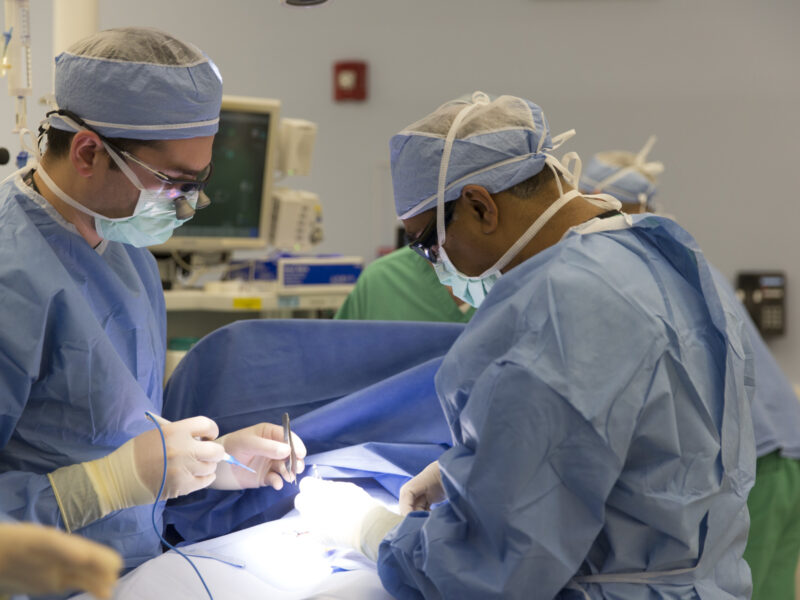Proteins as Antibiotic Alternatives for Urinary Tract Infections
Proteins as Antibiotic Alternatives for Urinary Tract Infections https://pediatricsnationwide.org/wp-content/uploads/2023/02/AdobeStock_524852081-1024x682.png 1024 682 Emily Siebenmorgen Emily Siebenmorgen https://pediatricsnationwide.org/wp-content/uploads/2023/05/Emily.Siebenmorgen-scaled-e1684876333147.jpg- March 03, 2023
- Emily Siebenmorgen

Antibiotic-resistant bacteria have made treating common infections challenging. In a new study from Nationwide Children’s Hospital, published in the Proceedings of the National Academy of Science (PNAS), researchers demonstrate a way to boost the body’s production of antimicrobial peptides, which may provide an alternative to antibiotic use.
With the rise of in antibiotic resistant infections, finding treatment alternatives is more important than ever – especially for the kind of bacteria that cause urinary tract infections (UTIs), called uropathogenic E. coli.
“Bacteria are acquiring resistance to the kinds of antibiotics that are typically used to treat UTIs at a high rate and there are currently no new antibiotics in development that address this issue, so it’s incredibly important to find other treatment options from a public health perspective,” Laura Schwartz, PhD, principal investigator in the Kidney and Urinary Tract Center at Nationwide Children’s and a lead author of the study.
In the study, researchers examined the impact of clinically-used drugs on boosting the production of peptides that act as antimicrobials against uropathogens, including antibiotic-resistant strains.
“These are really small proteins that your body naturally produces – especially in tissues that normally encounter pathogens, like your skin, respiratory, gastrointestinal and urinary tracts,” Dr. Schwartz explains. “These small molecules can kill or restrict growth of bacteria, and our lab is interested in the peptides that punch holes into cell membranes of bacteria to directly kill them.”
To identify therapeutics that increased antimicrobial peptide production, researchers used reporter cells that emitted light if a drug was able to induce expression of two specific antimicrobial peptides, RNase 4 or RNase 7. These antimicrobial peptides, or AMPs, are expressed by the urinary tract and have been shown to be protective against UTI.
“We developed these reporter cell lines and screened a library of FDA-approved drugs,” says Dr. Schwartz, who is also a research assistant professor at The Ohio State University. “We were hoping to find something that’s already on the market that we could repurpose for this use.”
The study, published in PNAS, found that histone deacetylase (HDAC) inhibitors had a positive effect on increasing antimicrobial peptide production and preventing UTIs.
“Currently, HDAC inhibitors are used to treat cancer,” Dr. Schwartz explains. “Obviously, we are a long way from recommending chemotherapy drugs for UTIs, but the key findings here identify an avenue to enhance the production of these peptides that is protective against UTIs. Future work will partner with collaborators who are equipped to develop these or similar drugs for safe use in treating or preventing UTIs.”
HDAC inhibitors were especially effective compounds for boosting ribonuclease 4 and 7 expression, which are highly expressed in the urinary tract.
“RNase 4 and 7 antimicrobial peptides have a wide range of targets – they can kill uropathogenic E. coli that commonly infect the urinary tract, along with several multi-drug resistant strains of uropathogenic E. coli,” says Dr. Schwartz. “Developing these AMPs as therapeutics for UTI would alleviate some of our reliance of antibiotics for UTI management.”
While this study focused on fighting antibiotic-resistant bacteria behind UTIs, it opens the door to repurposing medications as antibiotic-conserving therapeutics.
“The basic science of developing this novel pathway is the foundation of a larger solution to fighting antibiotic resistant infections,” says John David Spencer, MD, chief of the Division of Nephrology and Hypertension and one of the authors of the study. “It’s exciting to identify a new way to boost the body’s natural immune response.”
Reference:
Schwartz L, Bochter MS, Simoni A, Bender K, de Dios Ruiz Rosado J, Cotzomi-Ortega I, Sanchez-Zamora YI, Becknell B, Linn S, Li B, Santoro N, Eichler T, Spencer JD. Repurposing HDAC inhibitors to enhance ribonuclease 4 and 7 expression and reduce urinary tract infection. Proceedings of the National Academy of Sciences. Jan. 18, 2023;120 (4) e2213363120.
About the author
Emily Siebenmorgen is a Science Communication Specialist at Nationwide Children's Hospital with a passion for making research findings accessible. From her time writing at Battelle and AWRI's Center for Injury Research and Policy, she has experience distilling complex topics into simple takeaways for both professional and consumer audiences. Emily earned her BS in Psychology and BA in Strategic Communication from The Ohio State University.
-
Emily Siebenmorgenhttps://pediatricsnationwide.org/author/emily-siebenmorgen/
-
Emily Siebenmorgenhttps://pediatricsnationwide.org/author/emily-siebenmorgen/
-
Emily Siebenmorgenhttps://pediatricsnationwide.org/author/emily-siebenmorgen/September 29, 2022
-
Emily Siebenmorgenhttps://pediatricsnationwide.org/author/emily-siebenmorgen/October 17, 2022
- Post Tags:
- antibiotic resistance
- HDAC
- Urology
- UTI
- Posted In:
- Research










